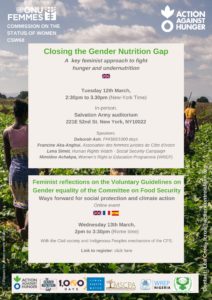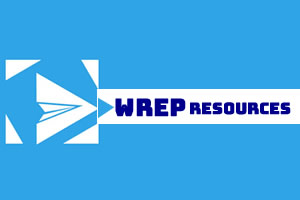The sixty-eighth session of the United Nation’s (UN) Commission on the Status of Women (CSW68) is ongoing and will run from 11th to 22nd March 2024 at the UN’s Headquarters New York City. The UN have so far invited representatives of it’s Member States, UN entities, and it’s accredited Economic and Social Council (ECOSOC) non-governmental organizations (NGOs) from all regions of the world.

As an NGO with Special Consultative Status of the UN’s ECOSOC, the Women’s Right to Education Programme (WREP), Nigeria’s Gender Equality and Social Inclusion (GESI) Think-Tank, WREP will be seizing this opportunity to canvass for more social investments that will enhance the visibility of women in decision making, increase the literacy level of girl children, as well as completely obliterate gender-based violence of any sort in Nigeria. Currently in Nigeria, only 6% of women are active in politics. Of the 109 senators in the parliament, only eight (7.34%) of them are women.
Nigeria is yet to reach the benchmark by the Beijing Declaration Platform for Action endorsed by the Economic and Social Council of having 30% women in positions at decision-making levels by 1995.
For education; girl-child marriage is still a barrier. About 43% of girls in Nigeria are married before their 18th birthday and 16% are married before the age of 15. Nigeria has experienced growing abduction and kidnapping of school children, with many girls forced into marriage or impregnated by their abductors. At least 1,687 students have been kidnapped from their schools in Nigeria since the first incident in the country’s resurgence of school abduction epidemic which started in March 2020 , the recent of which is the abduction of 278 pupils and teachers of the Government Secondary School and LEA Primary School, Kuriga 1, in the Chikun Local Government Area of Kaduna State, North-west Nigeria. (This resurgence of school abduction started in 2020 which is 6 years after the April 2014 abduction of the 276 schoolgirls from government secondary school in Chibok, a town in Borno State, North East Nigeria).
Women in Nigeria, regardless of demographic factors like age, social status, education, ethnicity, religion, and mental and physical ability, have been subjected to varying degrees of violence.
There is a need for the government to enforce the laws that punish offenders. Nigeria’s constitution provides that every individual’s dignity should be respected and nobody should be subjected to torture or to inhuman or degrading treatment. The Violence Against Persons Prohibition Act also prohibits all forms of violence in private and public life, while providing maximum protection and effective remedies for victims and punishment for offenders.
WREP in it’s twenty (20) years of existence have implemented so many programmes in line with recommendations from the CSW (write CSW out in full) using a Multi-Sectoral approach addressing issues around women and girls especially in the rural hard-to-reach areas. The CSW as the most important space for international advocacy on women’s rights will enhance WREP’s drive and expose it to the latest trend in the promotion of women visibility in decision making.
This CSW’s 2024 priority theme is “Accelerating the aAchievement of Gender Equality and the Empowerment of all Women and Girls by Addressing Poverty and Strengthening Institutions and Financing with a Gender Perspective,” while the review theme is “Social Protection Systems, Access to Public Services and Sustainable Infrastructure for Gender Equality and the Empowerment of Women and Girls”.

